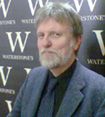
AUTHOR INTERVIEW
with Cormac Millar
formerly featured on the Penguin web siteWhat was the first crime novel you ever read?
Mrs McGinty's Dead , by Agatha Christie, when I was almost nine years old, in 1959. I was terrified. My mother, Eilís Dillon, had written three gentle, literate detective stories set in Ireland, but these I read later.
Who is your favourite crime writer?
Probably Ross Macdonald, but then there's Simenon, and Chandler, and Joseph Hansen, and John Mortimer, and John Le Carré, and others who have written one or more ridiculously good mysteries: Michael Gilbert, Stanley Ellin, William Garner, Graham Greene, Carlo Lucarelli, Michael Dibdin. The field of crime writing is filled with treasures waiting to be exhumed.
Which crime novel do you wish you'd written?
A ciascuno il suo ( To Each His Own ) by Leonardo Sciascia: a perfect Mafia novel of public corruption mingled with frustrated love. It also made a great film, now more or less unobtainable. New York Review Books have recently re-issued it in English along with some other Sciascia titles. His last book, Una storia semplice ( A Straightforward Story ) is also a little masterpiece, and made a beautiful film. Speaking of films, some of the finest crime stories come straight from the cinema ( The Godfather II , Sea of Love , Fargo ), and some films are incomparably better than the novels they adapt ( L.A. Confidential and Bertolucci's The Conformist ).
Why did you choose to write crime fiction?
The conventions of realistic fiction demand that we tell extraordinary stories of ordinary life. Crime fiction enables you to do that. It offers ready access to contradictory strata of experience and identity. Also, it is one of the ways of digging into the cracks in society. There is always something rotten in the state, and crime fiction lets us at it.
Has any thriller ever made you sleep with the lights on?
Not since I was nine years old. (I re-read Mrs McGinty's Dead recently, and slept soundly.) Black depression, sometimes lasting for months, is an occasional response to thrillers. John Le Carré's The Night Manager and Graham Greene's Brighton Rock did that to me.
If you were stranded on a desert island – which fictional character would you most want to be stranded with and why?
Jeffrey Archer, because he could entertain me with tales of his life and miracles until we were rescued.
If you had to compare your books to any author, who would it be?
Dante. His stuff is better.
When you begin – do you already know the end?
Yes, but it keeps changing.
What is the most outlandish plot idea you've come up with – and did it become a book?
A coterie of billionaires put forward a cocaine-fried halfwit to become President of the United States, controlling him through their nominee, the Vice-President. No, not a book.
What are you working on at the moment?
This questionnaire – and the plot of my third novel, THE BRIDGE, a classic crime story with leanings towards geopolitical satire.
QUICK FIRE:
First person or third person?
Third person, but with access to the inner thoughts of a main character.
US or UK?
Neither. I am an Irish citizen of Europe.
Marple or Morse?
No, thanks. Philip Marlowe, Lewis Archer and Dave Brandstetter would be more my cup of coffee.
Amateur sleuth or DCI?
An accidental amateur (although I can see the advantages of having a hero who doesn't have to be winched into position every time before he can start detecting).
Paperback or hardback?
Ideally, both. Penguin produce me in a large-format paperback, followed by the pocket size. I'm not sure I agree, but they seem to know what they're doing.
Past or present?
The present, distorted by memories of the past. My country, now emerging from a thirty years' war of terror, has traditionally been torn between compulsive forgetfulness and eruptions of mawkish commemoration. Your country (wherever you're reading this) could be rather similar. Also, your family.
Series or stand-alone?
A semi-series, in which a coherent world is gradually revealed.
Chandler or Hammett?
Definitely Chandler.
Please give your top three crime writing tips:
1) Be credible and realistic, but remember that we also need the incredible to engage our imagination. Muriel Spark said that good art is hypnotic rather than plausible. This is hard to do, yet it must be done.
2) Keep cutting. Amputate the end of every paragraph, and see if it still stands up. Chainsaw your adjectives. Rough up your scenes and leave them unfinished.
3) Do it well. Crime writing is on average better, and more demanding, than most other forms of literature. Yes, plenty of rubbish gets published, and sold, and gushingly reviewed, but that's true of all genres and there's room for more of the good stuff. Also, keep doing it. Even the greatest artists sometimes do bad work, and go on to produce enduring works of genius. Why shouldn't you?
28 November 2005
| Home